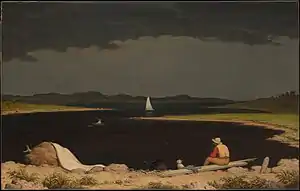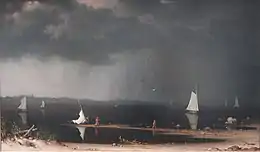Approaching Thunder Storm
Approaching Thunder Storm is an 1859 painting by American painter Martin Johnson Heade. It was his largest painting to date.[1] The painting is in the collection of the Metropolitan Museum of Art.[2] It is praised for its dramatic depiction of the threatening mood of blackening skies and eerily illuminated terrain prior to the storm itself.[2] The painting has been connected to mounting tensions before the Civil War, which were often expressed in terms of natural imagery.[3][4]
| Approaching Thunder Storm | |
|---|---|
 | |
| Artist | Martin Johnson Heade |
| Year | 1859 |
| Medium | Oil on canvas |
| Dimensions | 71.1 cm × 111.8 cm (28.0 in × 44.0 in) |
| Location | Metropolitan Museum of Art, New York City |
One of a series of paintings by Heade of coastal landscapes, this work was based on a sketch that Heade made of an approaching storm on Narragansett Bay, Rhode Island. Here, a fisherman sits by the shore watching the storm approach; there is a faint red bolt of lightning in the left part of the sky. To his left are a dog, an iron kettle, and a spread-out boat sail. Another fisherman is rowing toward the shore, having left his sailboat out on the bay. His placement in the composition helps provide a sense of distance and a narrative for the scene.[5]
Strazdes suggests that "Heade, by refusing to prettify his scenery by association, was attempting to inject into his artistic vision a serious, monumental simplicity it had not previously possessed."[6] The composition is very open, as if seen through a wide-angle lens, and relatively empty. The swathes of dark color are novel for a landscape work. The long horizon is an influence from Heade's contemporary, Frederic Edwin Church (with whom he shared a studio),[7] as in paintings such as Niagara.[6]

Numerous pentimenti suggest that Heade altered the composition over time; for example, the hills on the horizon were originally larger and more jagged. Records suggest that Approaching Thunder Storm was exhibited at the National Academy of Design in 1860.[6] In 1868, Heade painted Thunder Storm on Narragansett Bay, a similar composition.
References
- Strazdes, 164
- "metmuseum.org". www.metmuseum.org. Retrieved 2018-10-15.
- Harvey, Eleanor Jones (2012). The Civil War and American Art. New Haven: Yale University Press.
- Miller, Angela (1996). The Empire of the Eye: Landscape Representation and American Cultural Politics, 1825-1875. Ithaca: Cornell University Press.
- Cash, Sarah (1994). Ominous Hush: The Thunderstorm Paintings of Martin Johnson Heade. Dallas: Amon Carter Museum.
- Strazdes, 165
- Cao, Maggie (2018). The End of Landscape in Nineteenth-Century America. Berkeley: University of California Press.
- Strazdes, Diana J. (1987). "The Coming Storm". In Metropolitan Museum of Art (ed.). American Paradise: The World of the Hudson River School. Metropolitan Museum of Art. pp. 164-165. ISBN 9780870994975.